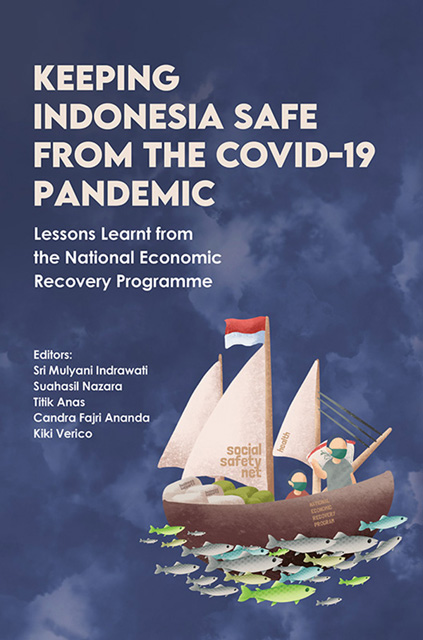 Keeping Indonesia Safe from the COVID-19 Pandemic
Keeping Indonesia Safe from the COVID-19 Pandemic Published online by Cambridge University Press: 30 June 2023
BACKGROUND
The Vision of Indonesia 2045 sets out the goal for Indonesia to become a high-income country as it celebrates its centennial anniversary of independence. With strong economic growth and a substantial decrease in extreme poverty, Indonesia has already achieved middle-income country status. Nevertheless, Indonesia needs to further expand its middle-class population to unlock its development potential and transition to a highincome country status in 2045. Achieving the Vision of Indonesia 2045 will require an inclusive annual growth rate of 5.1 to 5.7 per cent, a GDP per capita of US$19,794–US$23,199 and a middle-income population of around 70 per cent of the total populace by 2045 (Bappenas 2019).
One of the main engines of Indonesia's economic growth is workforce productivity. According to the 2021 World Bank report Pathways to Middle- Class Jobs in Indonesia, the increase in workers’ productivity could contribute as much as 88 per cent to the country's GDP per capita growth of 3.9 per cent between 2000 and 2017, equal to 3.5 percentage points annually. In other words, the pace of Indonesia's economic growth depends on how fast the productivity and skills of the workforce can be enhanced. Several studies have indicated that there is a skills mismatch issue in Indonesia, where the skill profile of the workforce has not kept up with the dynamic demands of the job market (World Bank 2018a; Yoong and Gil Sander 2020). The current economic growth momentum in Indonesia should be supported through innovative labour market policy measures to address this skill mismatch. The government can provide support through education and training scholarships, as well as on-the-job training, to upgrade the workforce.
The opportunity to become a high-income country in 2045 is also supported by Indonesia's ongoing demographic bonus where most of the population, or over 70 per cent, is in the prime working-age group. This demographic bonus, expected to last until 2030, has opened up an opportunity to accelerate Indonesia's economic development. However, Indonesia is also at risk of missing this opportunity without appropriate policies to equip the workforce with appropriate skills.
Three main issues have kept the impacts of the demographic bonus suboptimal.
To save this book to your Kindle, first ensure [email protected] is added to your Approved Personal Document E-mail List under your Personal Document Settings on the Manage Your Content and Devices page of your Amazon account. Then enter the ‘name’ part of your Kindle email address below. Find out more about saving to your Kindle.
Note you can select to save to either the @free.kindle.com or @kindle.com variations. ‘@free.kindle.com’ emails are free but can only be saved to your device when it is connected to wi-fi. ‘@kindle.com’ emails can be delivered even when you are not connected to wi-fi, but note that service fees apply.
Find out more about the Kindle Personal Document Service.
To save content items to your account, please confirm that you agree to abide by our usage policies. If this is the first time you use this feature, you will be asked to authorise Cambridge Core to connect with your account. Find out more about saving content to Dropbox.
To save content items to your account, please confirm that you agree to abide by our usage policies. If this is the first time you use this feature, you will be asked to authorise Cambridge Core to connect with your account. Find out more about saving content to Google Drive.